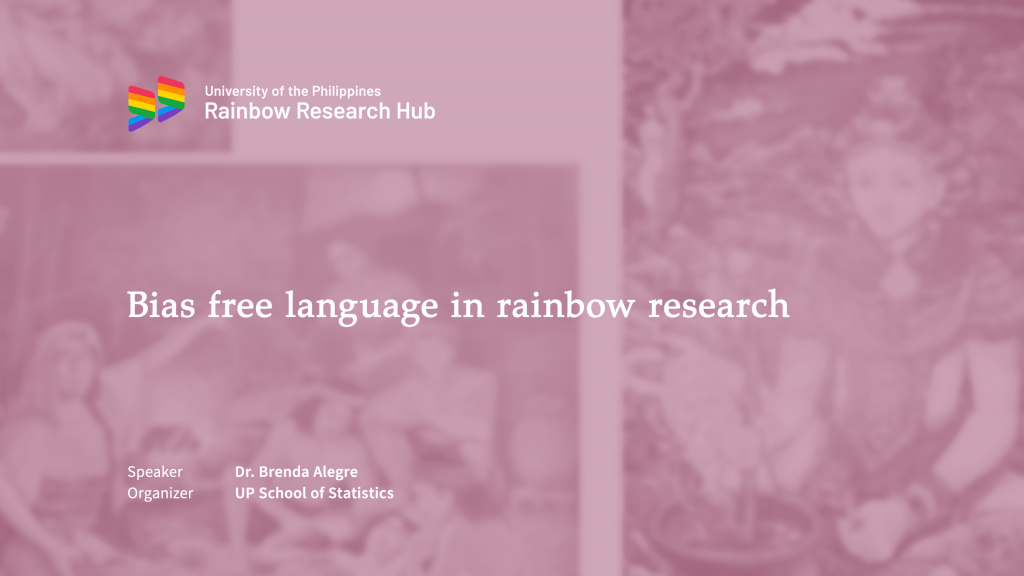
Essence
Content/Trigger Warning: Mentions of anti-LGBTQI slurs, pedophilia, sexual abuse and child sexual abuse, incest
In this video, Dr. Alegre talks about biased language or the use of words that imply prejudice against people with different traits and/or identities. She broke down common words and phrases used in scholarly work and in daily life and explained how these could be construed as offensive to certain groups while recommending alternative, politically correct terminology. Finally, Dr. Alegre zeroes in on the overall importance of accurate, sensitive, and bias-free language in research to further promote inclusivity and intersectionality within the academe.
Speaker: Dr. Brenda Alegre
Organization: UP School of Statistics
Explore
Express
Using any of the prompts below, reflect on the lecture and write a 500-word essay on your insights:
- Were there any words or phrases mentioned in the lecture that you had thought were acceptable to use but are apparently biased against a minority group?
- Have you yourself used language that is biased against a minority group? Or have you encountered someone else who used such language? What about language that is anti-LGBTQI in particular? What words or phrases were these?
- How do you think you should respond when you encounter a close friend someone who uses these words or phrases now that you know that they are biased language? Would your response be different if a family member uses such biased language?
Engage
- The lecture points out that language is deeply embedded and biased language may be difficult for people to unlearn. If you accidentally or mistakenly used biased language and were called out for doing so, how should you respond and why? How should you not respond and why?
- Why is it important for people who are not part of a minority group to avoid biased language and to use inclusive language instead? For example, why is it important for cisgender people to use language that affirms the gender identity of transgender people? Why is it important for endosex people to use language that is inclusive of intersex people and their experiences?
- When doing research on LGBTQI people or on minority groups in general, what can you specifically do during the different stages of the research process (enumerated below) to avoid bias against these groups and to promote “diversity, equality, equity, inclusivity, and respect”? The lecture already identifies general action points, such as being reflexive and culturally-sensitive and -aware.
- Research conceptualization
- Research design and methodology
- Data collection
- Data analysis
- Data reporting
- Research dissemination
Expand
On biased and anti-LGBTQI language: Media advocacy organization GLAAD has a media reference guide and glossary of terms that goes in-depth on the language that journalists and laypersons should use relating to LGBTQI people and related issues (such as family and parenting, Mpox, sports, etc.) and intersecting minority groups (such as communities of color, youth and older people, persons with disabilities, etc.), detailing terms to avoid versus best practices. As of writing, the GLAAD Media Reference Guide is on its 11th edition.
On avoiding cisgenderist and heterosexist bias and language in research: The American Psychological Association (APA) Task Force on Non-Heterosexist Research published an article version of their report that outlines how heterosexist bias can occur in research—from formulating research questions to interpreting and reporting results—and suggests how researchers can avoid and challenge it. The APA Committee on Lesbian and Gay Concerns also identifies problems in LGB terminology and how to reduce them in a separate publication. Ansara and Hegarty wrote a similar article on non-cisgenderist research in 2014.
On challenging biased language: The Anti-Defamation League (ADL) has multiple resources (from blogs to fact sheets, lesson plans, and more) that can help students and teachers in particular to challenge biased language. Start by assessing your own anti-bias behavior (link to download; English). Read up on tools and strategies to challenge your own biases and to respond to jokes, slurs, and other bigoted words.
